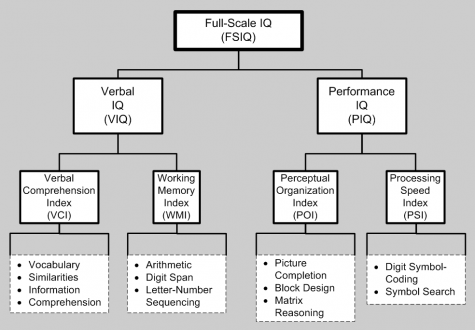How is Intelligence Measured?
Michael Quinn engages in a mental debate about the state of his IQ.
Intelligence Quotient is a man-made construct, a series of tests that measure how intelligent a person is. But, can something that we do not completely understand be measured?
From Ms. Wagner’s introduction to Human Behavior class, members of MDO recorded what was taught. From this discussion, we have learned that IQ is determined using a formula that divides your mental age by your actual age, and it is found by doing a series of standardized tests, centered around academic-heavy subjects. The average reading level of fourth graders in general make up what score they should have for their actual age. So, if a fourth grader had the reading level of a second grader, his mental age would be lower than his actual age and his IQ would be lower, and vice versa if he had the reading level of a sixth grader. This means that a fourth grader who is at a lower learning capability than the rest of his peers, is not smart, even if he is the most athletic or is a prodigy of the arts. But, when do we stop learning? Adults are not receiving educations in math and english once they graduate from school, so everyone is bound to have lower IQs as they age because their mental age and actual age eventually become the same.
There are three kinds of IQ tests, the Stanford-Binet Intelligence Test, the Wechsler Intelligence Test for Children and the Wechsler Adult Intelligence Scale. The child Wechsler test ends at the age of 16 and the adult test begins with 17. Why do we as humans try to measure intelligence, and are academics the only kinds of knowledge that make us smart? The IQ test tests people’s ability to solve “abstract-reasoning problems to concentrate on arithmetic, vocabulary, or general knowledge”. We use IQ tests for academic placement in school and for job applicants, so the people distributing these tests are really predicting what kind of occupation and income the test takers will have later in life, just from their ability in math and english. Ms. Wagner asks her class that since the IQ test only measures a person’s academic ability and the people who do well are intelligent at those specific subjects, does this mean that someone who is musically inclined or is an art prodigy is not also intelligent in those areas?

Depicted is a graphic organizer showing the different constituents of the Wechsler Adult Intelligence Scale.
The problem with the IQ test is that it does not measure every aspect of what humans are capable of doing, so the people who do not do well may be considered unintellectual even though they may accel at something different, like cooking or architectural design. People can be intelligent at different things that they do, and they should not be labeled because they do or don’t do well on an IQ test. If Johann Sebastien Bach and Wolfgang Amadeus Mozart, two renown musical geniuses, did not do well in school, would they too be considered unintelligent?

